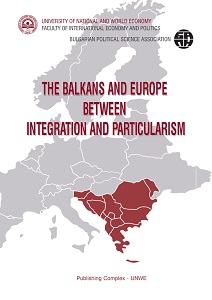Western Balkans as a Strategic Junction of International Terrorism: Regional Responces
Western Balkans as a Strategic Junction of International Terrorism: Regional Responces
Author(s): Ana Dimitrovska
Subject(s): Politics / Political Sciences, Geopolitics
Published by: Университет за национално и световно стопанство (УНСС)
Keywords: Western Balkans; Bosnia and Herzegovina; Albania; terrorism; extremism; counter-terrorism; socialization of radical elements; countering extremism
Summary/Abstract: Currently, the Western Balkans are becoming an important strategic junction of international terrorism and, in recent years, the region has become a transit corridor for radicalIslamists and terrorists aiming to relocate from the Middle East countries to the region. Staringfrom the 90s, we are witnessing a gradual creation of the so called "Balkan Caliphate" – the creating of a radical Islamic political space uniting all territories where Muslim minorities lives inthe region (Albania, BiH, Bulgaria, Greece, Kosovo, Macedonia, Serbia and Montenegro) througha Wahhabi religious colonization financed by a network of Islamic humanitarian NGOs funded bySaudi Arabia, Kuwait, Malaysia, Qatar, Libya, Turkey connecting them with the Middle East andTurkey. Starting from 2012, the Western Balkan countries have been undertaking serious efforts tocounter these threats and with the active participation of the international community they havestared adopting and implementing new national strategies giving priority to programs for rehabilitation, reintegration and de-radicalization of the returned foreign fighters and their families’members. The regional governments actively support the international counter-terrorism effortsand they are actively developing cooperation with international and regional police, intelligenceand judicial services. Regional intelligence services work closely with international organizations(United Nations, OSCE, Interpol, Europol, etc.), as well as with the security services of the UnitedStates, some EU countries and Turkey. However, very often their activities are giving diametrically opposite on-the-ground result to the goals they claim they are trying to achieve in the field, andthe serious flaws contained in their counter-terrorism efforts give the impression of a selfsabotage. Also, there is a lack of political will among the regional governments to establish closecooperation with the relevant structures of Russia and CIS engaged in countering terrorism andextremism in the post-Soviet space and having enormous experience in the field.
Book: The Balkans and Europe between Integration and Particularism
- Page Range: 242-255
- Page Count: 14
- Publication Year: 2019
- Language: English
- Content File-PDF

